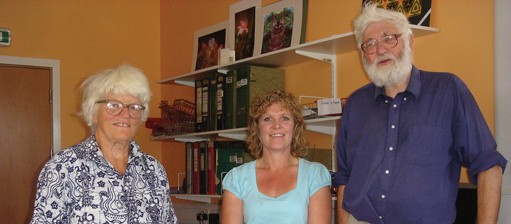Concord Media
Concord Media was founded in 1959 by Eric Walker and Lydia Vulliamy. Eric spoke to Viewfinder about the company and its films, explaining how Concord’s ethos and commitment to educational and social issues has been a constant guiding factor through their long and distinguished history.

Lydia Vulliamy, Pam Noble and Eric Walker of Concord Media.
How long have you been in business?
Concord started life at the end of 1958 purely by accident. I was working at British Transport Films, and with a colleague, went to film the first sit-down at an American nuclear base in England. We were the only people there with a camera and we sold use of the footage to ITV News. With that payment (of £100) we made a film of the sit-down and the ‘Nuclear Disarmament Newsreel Committee’ was born!
In 1961 I went to the London Film Festival and saw two remarkable anti-war shorts: Neighbours by Normal Maclaren, and a Czech cartoon called Attention. None of the regular film distributors seemed interested, so I bought the rights and the nucleus of a distribution library was started. At that time, the only educational 16mm film library of note was the mammoth Rank Film Library which only carried didactic teaching film. For example, under the heading ‘Citizenship’ in the Rank Library there was just one film, about sewage farms.
About this time I met with the heads of both OXFAM (at that time still called Oxford Committee for Famine Relief) and War on Want, who were, like me, both Quakers. They were thinking about using films to promote their message. They argued that the library should distribute not only films of protest but also films about need. So we changed our name to the Concord Films Council.
During this period we also took on the distribution of Elinor Goldsmeid’s film Childhood – Right of Every Child, which Rank and other film libraries had rejected. This led to Concord’s association with James and Joyce Robertson of the Tavistock Clinic, whose groundbreaking films A Two Year Old Goes to Hospital and its sequel, Going to Hospital with Mother, led to great changes in the way children are cared for in hospitals, with regard to visiting by parents. These films plus the equally game-changing films about the harmful effects of putting short-term stay children into residential nurseries instead of fostering, (Young Children in Brief Separation) continue to sell throughout the world.
In 1966 Concord acquired distribution rights for Peter Watkins’ film The War Game, which the BBC, under pressure from the government, banned from TV transmission, despite having commissioned it in the first place. Although the BBC refused to supply The War Game directly to us, a compromise was reached by which the BFI sub-contracted to Concord. Very quickly over one hundred 16mm prints were in circulation and being shown throughout the country.
What subject areas do you specialise in?
Concord’s programmes fall into seven main headings: Counselling, Mental Health, Health and Care, Child and Adolescent, Social Concern, Equality and Diversity, Arts and Culture. Under these main categories there are about 80 sub-categories so that programmes on particular themes can be quickly found.
Are your older films still available?
All our programmes and films are kept in distribution if possible: their value for researchers doesn’t lessen with age. For example, we tend to assume that the reduction of the welfare state started quite recently but the 1986 film, Farewell to the Welfare State, shows that the process began decades ago.
Is your material available to stream and/or download
Almost all films can be streamed/downloaded as well as being available on DVD in both PAL and NTSC formats.
Could you tell us a bit about one of your releases and how it encapsulates what Concord is all about?
It is difficult to pick one particular film which encapsulates our ethos. Concord has always been an educational charity run by a Council comprised of Quakers in Suffolk and so we try to embody that ethos which can be summed up as a concern for individuals and for our world. However, if I had to pick one, I’d A Class Divided (1985), film about Jane Elliott’s famous experiment about discrimination through eye colour. This is a film that has changed many peoples attitudes to issues of race and colour.
Details of all Concord releases can be found on the Learning on Screen Find DVDs database, as well as the Concord website: concordmedia.org.uk

 Learning on Screen
Learning on Screen